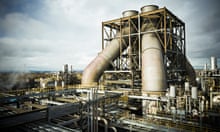Chemicals used in everyday household items from washing-up liquid to laundry tablets are a huge hidden source of carbon emissions, according to a report.
The thinktank Green Alliance is calling on UK ministers to lead a green revolution in chemical manufacturing to cut the carbon footprint of everyday consumer products.
In a report on Monday, it said the chemicals used to manufacture washing-up liquid and the plastic bottles to contain it were responsible for the same annual carbon emissions as about 40,000 cars. The production of laundry tablets and their breakdown in sewage works contributed the equivalent emissions of 600,000 cars a year, the report said.
Fossil fuels are often the main ingredient in many of the chemicals used to produce everyday products, and the fuels also generate the energy required to make them. Chemicals are used in more than 90% of everyday products including paint, fertilisers and plastics.
About 70% of emissions from UK chemical manufacturers come from burning fossil fuels on site to process chemicals such as ammonia and ethylene.
Liam Hardy, a policy analyst at Green Alliance, said: “The chemicals used in everyday products are a huge hidden source of carbon emissions. What we need now is for the government to help British manufacturers make their production processes greener.
“This should not only help to reduce our carbon footprint and make the UK a science leader but can also safeguard good jobs in our industrial heartlands.”
The report calls for ministers to support the electrification of the chemical sector by offering access to cheap renewable power and incentivising plants that move away from fossil fuel as an energy source. It also urges the government to improve the reuse and recycling of products, and to increase innovation funding to help the industry move away from fossil fuels as a chemical ingredient.
The chemical industry has a target to reduce emissions by 90% by 2050.
Jonathan Hague, the head of clean future science and technology at the consumer goods company Unilever, said the UK must address energy and non-energy emissions from chemicals based on fossil fuels if the country is to achieve net zero.
“We have set ourselves ambitious goals to halve the greenhouse gas impact of our products per consumer by 2030 … we’re eliminating virgin fossil-derived chemicals from our laundry formulations and innovating new ingredients with low end-of-life emissions. But we know we can’t do it alone,” he said.










